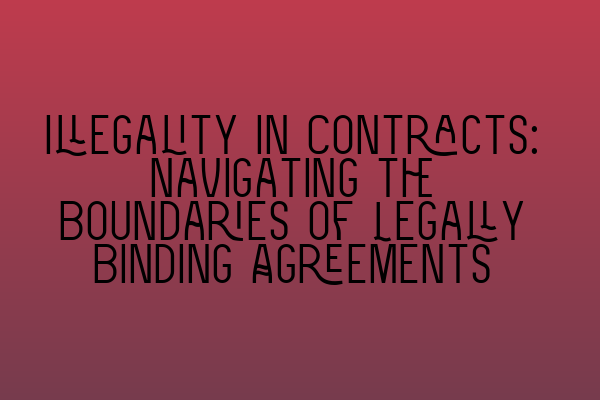Illegality in Contracts: Navigating the Boundaries of Legally Binding Agreements
Contracts are the lifeblood of business transactions, ensuring that parties are bound by their mutual agreements. However, not all contracts are created equal, and there are circumstances where a contract may be deemed unenforceable due to illegality. Understanding the boundaries of legality in contracts is essential for solicitors, businesses, and individuals alike.
Illegality can arise in various forms, such as contracts that involve illegal activities, contracts against public policy, or contracts that violate statutory provisions. The consequences of engaging in illegal contracts can be severe, ranging from unenforceability to criminal prosecution. As a solicitor, it is crucial to navigate these boundaries to protect your clients’ interests and uphold the rule of law.
1. Contracts Involving Illegal Activities
One of the most straightforward scenarios where a contract can be deemed illegal is when it involves illegal activities. This includes agreements to carry out criminal acts, such as drug trafficking, money laundering, or fraudulent schemes. Engaging in such contracts not only exposes individuals to legal repercussions, but it also undermines the integrity of the legal system.
In many jurisdictions, contracts that involve illegal activities are considered void ab initio, meaning that they are invalid from the outset and cannot be enforced by either party. The courts will refuse to intervene in disputes arising from illegal contracts and will leave the parties to bear the consequences of their actions.
2. Contracts Against Public Policy
While contracts involving illegal activities are relatively clear-cut, determining what constitutes a contract against public policy can be more nuanced. Contracts against public policy include agreements that are harmful to society, morality, or public interest. Examples of such contracts may include contracts for human trafficking, contracts to commit acts of discrimination, or contracts that restrict competition in an anti-competitive manner.
The courts will assess contracts against public policy on a case-by-case basis. The main consideration is whether the contract undermines public welfare and goes against the greater good. If a contract is found to be against public policy, it will be deemed unenforceable, and the innocent party may be entitled to restitution.
3. Contracts in Violation of Statutory Provisions
In addition to contracts involving illegal activities and contracts against public policy, contracts that violate statutory provisions can also be rendered unenforceable. Statutory provisions are laws enacted by government bodies, and contracts that contravene these laws are deemed invalid.
These statutory provisions can vary depending on the jurisdiction and the subject matter of the contract. For example, contracts that violate consumer protection laws or violate employment regulations may be deemed unenforceable. It is essential for solicitors to stay updated on current legislation and advise clients accordingly to ensure compliance and avoid potential legal pitfalls.
Conclusion
Navigating the boundaries of legality in contracts is a fundamental aspect of contract law. As a solicitor, it is your duty to guide your clients in creating enforceable agreements while avoiding contracts that may be deemed illegal or unenforceable.
By understanding the principles behind illegality in contracts, you can help your clients safeguard their interests and protect them from potential legal repercussions. It is essential to conduct thorough due diligence, review contracts meticulously, and keep abreast of changes in legislation to provide the highest level of legal counsel.
If you are preparing for your SQE exams and would like further practice materials, check out our related articles:
